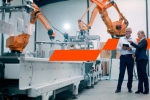
Robotic Process Automation
Digital operations is a proven approach to improving customer experience
Customers’ expectations of businesses are being transformed towards real-time, seamless service. At the same time, businesses are facing low-growth environments and declining benefits from maturing traditional operational strategies. Are the speed and cost benefits of Robotic Process Automation the next game changer for Australian businesses?
Robotic process automation (RPA). The next productivity
Debunking the concept of Robotic Process Automation
Using software robots that are easy to configure, require little IT expertise and that are simple to train and deploy, Robotic Process Automation (RPA) speeds up processing and reduces error rates by automating manual tasks.
RPA differs from traditional software by working at the user interface level, replicating the exact actions a human user would take and creating, in effect, digital operations.
Why RPA?
RPA is part of the ‘Fourth Industrial Revolution’ because of the dramatic improvements it makes on operations processes:
- Runs at ~33% of the cost of an offshore resource and ~10% of an onshore resource
- Reduces process time by up to 90%
- Reduces error rate to almost nil
- Strengthens risk and control management
- Improves customer advocacy, revenue and retention
- Frees up personnel to provide personalised services and manage unstructured data
- RPA software is a non-intrusive technology that doesn’t require integration like ERP systems and BPM.
How can PwC help?
PwC can assist you across through all stages of your RPA journey, including:
Strategy: Ensuring that RPA is incorporated into your strategy and aligned to key elements including operating model, IT, workforce and risk.
Opportunity assessment: Considering benefits beyond simple cost reduction. Understanding how RPA can benefit customer experience, revenue growth, risk mitigation and operational agility.
Deployment: Bringing a range of RPA-specific lessons, including:
- Governance models
- Agile work practices
- Integrating process, risk and customer experience into RPA design
- Automation Centre of Excellence delivery
Sustainability: Extending our support to managed service options for RPA.
Our latest insights
RPA and your digitisation strategy
Relentless pressure is forcing organisations to push beyond traditional operational strategies. How could RPA fit as part of your broader digitisation strategy?
Organise your future with Robotic Process Automation
The impact of Robotic Process Automation on a company’s operations and competitive positioning is significant on a number of fronts: economic value, workforce advantages, quality and control improvements, and flexible execution.
Robotic process automation – friend or foe for your risk profile?
The benefits from a cost perspective are clear and often form the major driver for the initial adoption of RPA – but what about the risks?
A key benefit of automation is improved compliance accuracy as the robot never deviates from the configured algorithms and business program logic programmed into the software. However, in this also lie the possible weaknesses.
How do you know RPA is working as intended? What are the regulatory considerations? What about privacy and data protection considerations when implementing RPA. Our latest article walks you through the early considerations of governance, risk and assurance to make RPA your friend.
People, change... and robots
Managing the people and change aspects of implementing Robotic Process Automation (RPA) in the workforce.
By revolutionising business processes and workflows, RPA offers a multitude of financial and non-financial benefits. However, most companies are concerned how their workforce will respond to RPA amidst fears over job loss. This article explores the ways in which businesses can embrace technological innovations offered by RPA by engaging with their employees to create the organisational and cultural change needed to successfully adopt RPA into business as usual operations.



















